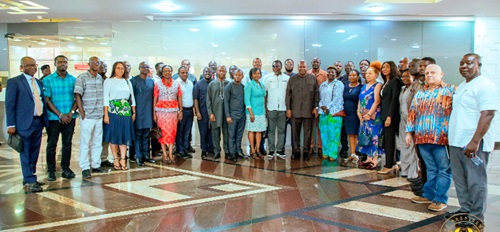President John Mahama has projected that the Ghana cedi will stabilise within a band of GH¢10 and GH¢12 against the United States (US) dollar, describing it as a fair value to support both exporters and importers while maintaining macroeconomic stability.
Speaking at a meeting with the Federation of Associations of Ghanaian Exporters (FAGE), the President acknowledged the recent currency appreciation but cautioned against an excessively strong cedi, which could harm export competitiveness.
“Some people say the cedi could fall to GH¢4, but we know the true value is not there.
If it drops that low, it will kill all export businesses,” he said.
“Following consultations with the Minister of Finance and the Governor of the Bank of Ghana, the government believes the cedi’s real value lies between GH¢10 and GH¢12,”
President Mahama said.
The recent forex auction has already brought the exchange rate to just above GH¢10, which signals stability.
President Mahama urged exporters to capitalise on the favourable rate, noting that cheaper fuel, lower port charges and reduced raw material costs should boost production.
However, he cautioned importers against flooding the market with foreign goods, urging a shift towards local production and import substitution.
Delegation
Led by the President of FAGE, Davis Korboe, the meeting was attended by representatives of the over 22 associations and affiliates that make up FAGE.
They include mango growers, pineapple growers, Ghana Root and Tubers Exporters and textiles manufacturers.
Others were vegetable exporters, handicraft producers, service providers, cashew and other nut processors.
Also present were senior government officials, including the Chief of Staff, Julius Debrah; Presidential Advisor, Joyce Bawa Mogtari, and Secretary to the President, Dr Callistus Mahama.
To further support exporters, President Mahama said the government would streamline export processes, enhance credit access through the Ghana Exim Bank, and invest in export infrastructure such as cold chain facilities and pack houses.
President Mahama also pledged to address FAGE’s exclusion from the Ghana Export Promotion Authority (GEPA) Board, calling it an oversight that would be corrected.
With non-traditional exports hitting $3.6 billion, the President expressed optimism about reaching $5 billion in two years and $10 billion by 2030.
He emphasised the African Continental Free Trade Area (AfCFTA) as a key opportunity, urging exporters to utilise Ghana’s strategic location for faster access to European, Middle Eastern and American markets.
President Mahama said plans were underway to develop the Volta Lake Economic Zone, leveraging the lake’s resources for agribusiness.
The project would include an inland port, roads and an export processing zone to facilitate production and rail transport of goods to Tema for export, he added.
Job creation
On job creation, he reaffirmed the government’s commitment to expanding export-driven industries to create jobs and curb illegal migration.
“If we support your businesses, our youth won’t risk crossing deserts for jobs,” President Mahama stated.
He also backed the Pan-African Payment and Settlement System (PAPSS) to ease intra-African trade and promised to champion exporters’ concerns, drawing from his own experience as a farmer.
President Mahama disclosed his active involvement in agriculture, highlighting his farms as part of his contribution to Ghana’s food security and economic growth.
President Mahama cultivates maize, soya beans and plantains, alongside livestock rearing.
"I’m in the agriculture space myself, not as an exporter, but I contribute to Ghana’s food security as a producer," he said.
His comments were met with applause from exporters, who he described as "critical to Ghana’s economy" for their role in bringing in foreign exchange.
President Mahama also accepted an invitation to FAGE’s upcoming expo on Wednesday, June 11, this year and pledged his continued collaboration to strengthen the country’s export sector.
AfCFTA implementation
Mr Korboe noted the group’s pivotal contributions to Ghana’s non-traditional export sector, which recently secured $260 million in orders at the Fruit Logistica Fair in Berlin, Germany.
He, however, stressed the need for accelerated action on AfCFTA, urging the government to eliminate non-tariff barriers, harmonise trade standards and improve logistics infrastructure.
The federation cited frustrating customs procedures and unreliable shipping lines as major obstacles to intra-African trade.
It also called for the swift implementation of the Bank of Ghana’s Next-Gen Digital Payment Infrastructure to facilitate seamless cross-border transactions.
Support for 24-hour Economy
Mr Korboe expressed FAGE’s strong support for the government’s 24-hour Economy policy, and said it had the potential to reduce post-harvest losses and enhance export competitiveness.
The federation pledged to collaborate with state agencies to develop sector-specific interventions, including round-the-clock processing and cold chain logistics.
It also called for improved financial inclusion, lower interest rates on agricultural loans and modern extension services to support smallholder farmers.
The federation identified key products, including chilli pepper, pineapple, mango and coconut, as having high global demand and called on the government to prioritise value addition, agro-processing and infrastructural development to transform Ghana into Africa’s leading agricultural exporter.

